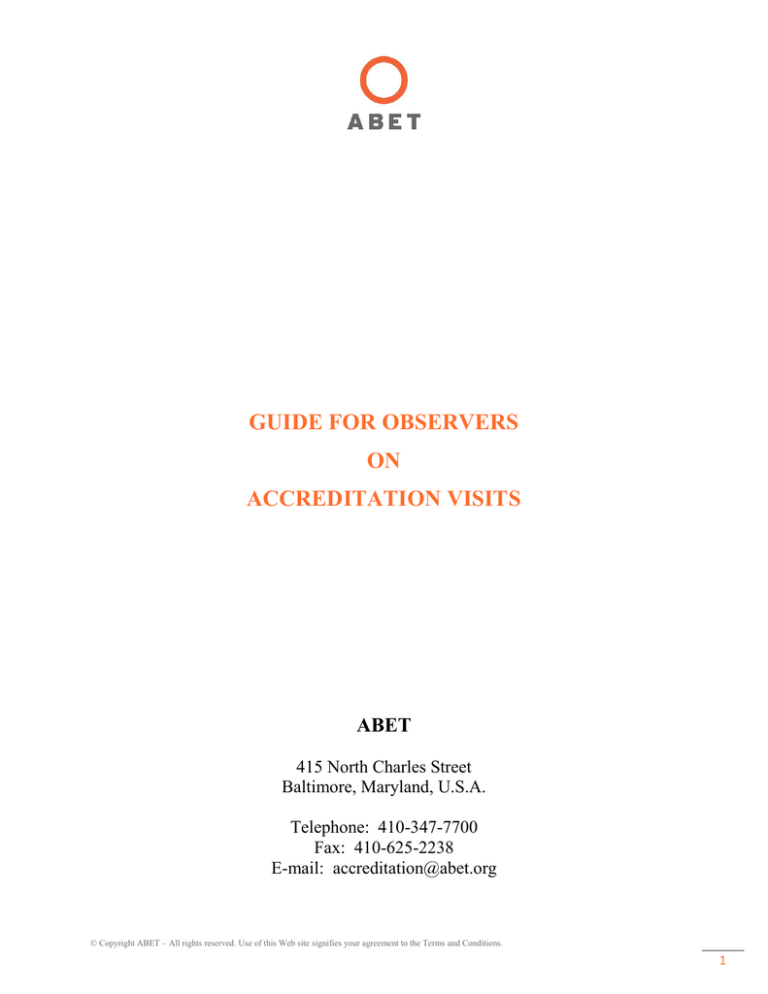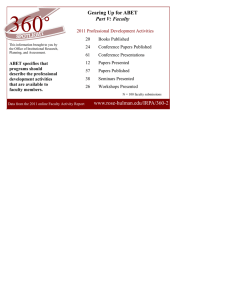
GUIDE FOR OBSERVERS
ON
ACCREDITATION VISITS
ABET
415 North Charles Street
Baltimore, Maryland, U.S.A.
Telephone: 410-347-7700
Fax: 410-625-2238
E-mail: accreditation@abet.org
© Copyright ABET – All rights reserved. Use of this Web site signifies your agreement to the Terms and Conditions.
1
Introduction
ABET, Inc. sends teams of evaluators to campuses around the world for the purpose of determining
whether programs satisfy the accreditation criteria of one or more of ABET’s Commissions. Observers
are often included on these teams for the purpose of learning how the ABET accreditation process works.
These observers generally fall into one of the following categories:
A. Observers representing one of ABET’s Member Societies The purpose of observers in this
instance is to provide training to individuals who have been selected by their Society to serve as
Program Evaluators.
B. Observers representing one of the State Boards for Professional Registration within the United
States The purpose of observers in this instance is to provide the State Boards with first-hand
information about how ABET’s accreditation process functions.
C. Observers representing one of ABET’s sister accreditation agencies either within or outside of the
United States The purpose of observers in this instance is to share information about ABET’s
accreditation process.
D. Observers representing a home-country’s accreditation agency or national education authority
outside of the United States The purpose of observers in this instance is to facilitate mutual
learning in quality assurance for higher education between organizations.
This document is intended to provide information about how arrangements for observers are made and
how observers should participate in the visit.
Historical Background
There are several steps in ABET Program Evaluator training. Initially, Program Evaluator candidates
who are selected by the ABET Member Societies attend ABET Program Evaluator training. Candidates
who successfully complete the training requirements may then be required to accompany an experienced
program evaluator from their Society as an observer on a program visit. This requirement is imposed by
the Societies and not by ABET.
ABET, formerly the Engineers' Council for Professional Development, was founded in 1932. Then, as
now, the State Boards of Professional Registration sought means by which the educational credentials of
applicants to the licensure process could be validated. Those programs in engineering which are
accredited by the Engineering Accreditation Commission of ABET have met the basic requirements of
preparing individuals to enter the engineering profession. The State Boards of Professional Registration
rely on the accreditation process as a means of assuring the quality of engineering graduates. In order for
the State Boards to be familiar with and to ascertain the quality of the accreditation process, ABET invites
representatives of the State Boards to participate in accreditation visits as observers.
Moreover, ABET is often asked by its sister accreditation agencies to permit observers for the purpose of
sharing information about its accreditation process. In many instances, these observers represent
accreditation agencies outside the US that are in the process of formation.
Lastly, ABET extends an observer invitation to those accreditation agencies outside US which approved
programs to seek ABET accreditation. Programs outside the US new to ABET must submit an
© Copyright ABET – All rights reserved. Use of this Web site signifies your agreement to the Terms and Conditions.
2
appropriate approval (Request for Approval; RFA) from the home-country’s highest national
accreditation agency or educational authority. The requirement of such approval submission stems from
the fact that ABET must ascertain that programs are housed in a financially and educationally stable
institution. In addition, ABET respects the program’s in-country quality assurance system and does not
wish to interfere with existing accreditation activities. Having observers from accreditation agencies or
education authorities outside the US offers a great opportunity for ABET teams and the local
organizations to share in exchange and mutual learning in the sphere of quality assurance for higher
education.
How are Arrangements made for an Observer to be included in a Visit Team?
How is an observer assignment initiated?
Observers from Category A -- Society Trainees: The Society should include observer nominees along
with their Program Evaluator assignments provided to ABET. The Team Chair will then contact the
observer to complete the arrangements.
Observers from Category B – State Board Observers: ABET will advise the State Boards of
upcoming visits after visit dates have been confirmed and posted. Contact information for the Team
Chair will be provided by ABET to the State Board. The State Board and the Team Chair should
communicate directly concerning the inclusion of an observer on the visit.
Observers from Category C -- Observers from sister accreditation agencies: A request from a U.S.
accreditation agency should be made to ABET by e-mail (accreditation@abet.org) to secure initial
approval. In the case of accreditation agencies outside the US, a request should be made to ABET by
e-mail (international@abet.org) to secure initial approval. This request should include a current, brief
biographical resume of the observer and the reason for the request.
Observers from Category D – Observers from accreditation agencies or education authorities outside
the US: The participant’s name, biographical resume, and complete contact information must be
provided to ABET HQ by e-mail (accreditation@abet.org or the designated contact) no later than
August 31st following the submission of a Request for Approval (RFA).
How is final approval of the observer’s participation obtained?
In the cases of observers from Category A and Category B, the Team Chair, and the institution being
visited must approve each observer included on the visit team. In the cases of observers from
Category C and Category D, ABET Headquarters (HQ) in addition to the Team Chair and the
institution being visited must approve each observer candidate before being included on the visit
team.
Any observer who fails to comply with the observer approval procedure, the policies pertaining to
conflict of interest and confidentially, or the guidelines provided below will not be included in the
visit team.
© Copyright ABET – All rights reserved. Use of this Web site signifies your agreement to the Terms and Conditions.
3
Who pays the observer’s expenses?
ABET is not responsible for reimbursement of observer expenses. An observer should contact
his/her sponsoring organization to determine policies for reimbursement of travel expenses.
Conflict of Interest
In no case will an observer be accepted if the individual has a real or perceived conflict of interest with
respect to the institution being visited. Conflicts of interest include graduates, faculty members, or
members of boards or committees of that or neighboring institutions. Conflict of interest questions
should be broadly construed as applicable to any individual who, in some way or another, is related to the
institution or may have any interest in the institution other than the accreditation visit.
In the case of State Board observers, it is understood that the issue of conflict of interest must be
interpreted in a less restrictive way. Graduates of the institution may be acceptable as long as they are not
active in alumni groups or other functions related to the institution in positions of leadership which might
affect their objectivity or inhibit interaction with the institution. A common-sense rule should be applied.
Questions related to potential conflicts of interest should be directed to the Accreditation Director
(accreditation@abet.org).
Confidentiality during the accreditation process
All aspects of the visit must be regarded as STRICTLY CONFIDENTIAL. Observers may provide
information related to the accreditation process to their own organization. However, they must not relate
information about any specific accreditation issues or recommended actions to anyone other than
members of the visiting team. Observers must sign the ABET Observer Confidentiality and COI
Form prior to the visit. The signed copy should be sent to the Team Chair with a copy to
accreditation@abet.org.
Observers will be furnished the same information as provided by the institution to the visiting team.
These materials must be considered to be confidential. Upon completion of the visit, these materials
should be returned to the Team Chair or destroyed.
Guidelines for Observers
The accreditation visit is carried out by ABET at the invitation of the institution. All communications
with the institution must be made through ABET's agent, the Team Chair.
During the observer approval process prior to acceptance, the observer and the represented agency should
NOT contact the visit institution in order to ensure the observer approval process is clear and fair; all
coordination must be made through ABET HQ and/or the ABET Team Chair.
Observers from Category D must provide ABET HQ with the requisite information including a current
biographical resume, name and complete contact information by August 31st well before the scheduled
© Copyright ABET – All rights reserved. Use of this Web site signifies your agreement to the Terms and Conditions.
4
accreditation visits. Any observer who fails to adhere to the approval process protocol will not be
included in the visit team.
Observers must refrain from giving any interpretations of the accreditation criteria or any assumption
pertaining to accreditation decisions. The ABET team members are assigned to evaluate specific
curricula and support areas. They have received their appointment at the recommendation of the ABET
Member Society whose discipline they represent and have been appropriately trained.
Observers do not have authority to act as official program evaluators. However, the Team Chair may,
with the consent of the observer and the institution, assign an observer any duties which will enhance the
quality of the visit without conflicting with the duties of the designated Program Evaluators.
Observers are invited to participate in all meetings and discussions, to ask questions, and to make
comments when appropriate. However, care must be exercised that any comments to the institution must
be in conformity with the applicable accreditation criteria.
Observers should become familiar with the applicable accreditation criteria. These criteria and related
documents are available on the ABET website (www.abet.org).
Observers are encouraged to arrange to stay for the entire period of the visit. Considering the multilateral
effort which goes into the scheduling, preparation and management of the visit, observers, once
committed, are encouraged to participate in the entire visit.
Observers must not carry out any personal business, or any business on behalf of their organizations,
while participating as observers on ABET visits.
Observers are encouraged to submit a report on their observations to the Team Chair following the visit.
ABET Headquarters should also be provided with a copy of any report made to the Team Chair or to the
observer's own organization.
Observers should not expect to participate in the portion of the accreditation process that occurs after the
visit. ABET’s invitation to participate in a visit does not extend to the portion of the accreditation process
that occurs after the visit.
Guidelines for Team Chairs
The Team Chair will thoroughly check for any real or perceived conflict of interest upon receiving the
candidate’s information prior to confirming an approval from the visit institution, before rendering a
decision on inclusion of the individual in the team. Observer approval or rejection by the team chair must
be substantiated through strict adherence to the conflict-of-interest criteria.
In arranging the visit, the dean of the institution or the designated contact person should be advised of any
observers, participants’ role on the team, and the institution’s right for declination. Approval should be
obtained for all observers accompanying the team.
The Team Chair, not the institution, should handle all negotiations between the ABET Member Societies,
State Boards, or other organizations and the institution.
© Copyright ABET – All rights reserved. Use of this Web site signifies your agreement to the Terms and Conditions.
5
All team members should be briefed on the duties and limitations of observers accompanying the visiting
team. There should be no misunderstanding as to the assigned roles of the various team members.
Observers should be reminded that they are not authorized to interpret accreditation criteria or to express
opinions to the institution that might be construed as reflecting ABET policy or accreditation decisions.
The Team Chair should handle any complaint regarding the participating observer reported by the visit
institution during the on-site visit or report to HQ for advice. All Team Chairs are encouraged to share
their feedback with HQ if there is anything worth attention or improvement.
Observers should not carry out any official duties on behalf of their organization or conduct any personal
business during the visit.
The observer from a ABET Member Society should work primarily under the direction of the Member
Society’s Program Evaluator.
The Team Chair may, with the consent of the observer and the institution, assign to an observer any duties
which will enhance the quality of the visit without conflicting with the duties of the designated Program
Evaluators. However, observers do not have authority to act as Program Evaluators.
Observers should be encouraged to report their observations to the Team Chair, either orally or in written
form. They should be requested to provide ABET Headquarters with information copies of any reports
submitted to the Team Chair or their organization.
Guidelines for Visit Institutions
The ABET Team Chair will advise the dean of the visit institution or the designated contact person as to
any potential observers before being approved by the institution and officially included in the evaluation
team. These candidates must be approved by ABET (HQ and the Team Chair) prior to inquiry of the visit
institution’s decision.
Institutions should not accept any observers who have not been approved by ABET HQ and the Team
Chair. In the event that any observer candidate or accreditation agency contacts the visit institution
without going through ABET, the institution should refer this individual/agency to contact ABET and
refrain from accepting any observer until receiving a written notification from ABET HQ or its agent, the
Team Chair.
Institutions should feel free to share their feedback or report any inappropriate behaviors and comments
regarding the participating observers to ABET HQ or the Team Chair.
© Copyright ABET – All rights reserved. Use of this Web site signifies your agreement to the Terms and Conditions.
6
CONFIDENTIALITY OF INFORMATION
(Section Fourteen, ABET Rules of Procedure)
CONFIDENTIALITY
A.
Ethical Conduct:
ABET requires ethical conduct by each volunteer and staff member engaged in fulfilling
the mission of ABET. The organization requires that every volunteer and staff member
exhibit the highest standards of professionalism, honesty, and integrity. The services
provided by ABET require impartiality, fairness, and equity. All persons involved with
ABET activities must perform their duties under the highest standards of ethical
behavior. It is the policy of ABET that information provided by the institution is for the
confidential use of ABET and its agents, and will not be disclosed without specific
written authorization of the institution concerned.
B.
Privileged Information:
The contents of all materials furnished for review purposes and discussion during the
Commission meetings are considered privileged information. The contents of those
documents and the accreditation actions taken may be disclosed only by staff, and only
under appropriate circumstances. All communications between institutions and
evaluators or Commissioners regarding final accreditation actions must be referred to
ABET headquarters.
© Copyright ABET – All rights reserved. Use of this Web site signifies your agreement to the Terms and Conditions.
7
CONFLICT OF INTEREST AND CONFIDENTIALITY STATEMENT
I have received and read the ABET Conflict of Interest and Confidentiality Policies. I
understand that the intent of these policies is to disclose real or perceived conflicts of interest, to
recuse myself from decisions and discussions related to real or perceived conflicts of interest, to
act impartially and avoid the appearance of impropriety, and to protect the confidential nature of
the accreditation process. I will not participate in any decision-making capacity regarding the
accreditation of a program if I have or have had a close, active association with an institution or
program that is being considered for official action by ABET. I will not participate in any
decision for which I, or the organization that I represent, may benefit materially.
In addition, I understand that materials furnished for the visit are considered privileged
information and, consequently, are confidential. I understand that no copies may be made of
any materials or documents provided as part of the accreditation decision-making process.
All elements of ABET’s accreditation process are to be treated in a professional and confidential
manner. Both ethical and legal considerations demand that the information acquired through the
accreditation process not be used for purposes other than the accreditation process unless prior
permission is obtained from the institution or program.
____________________________________________________________________
Signature
_____________________________________________________________________
Print Name
Date
______________________________________________________________________
Position
© Copyright ABET – All rights reserved. Use of this Web site signifies your agreement to the Terms and Conditions.
8



